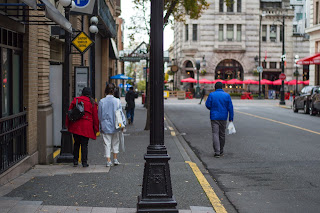Housing and the City: Part 1 The Downtown Core
Our city is going to change over time. All cities change over time, all cities grow, and our city isn't an exception. It will change and grow - we've seen that, rather dramatically over the last 20 years, with our downtown core morphing from a place with few buildings more than 10 stories, to one where larger buildings are the norm.
Generally speaking, that is not a bad thing in and of itself, particularly as those who reside in the core tend not to need to drive as most of their day to day needs can be met on foot. That said many may decide to partake in car shares, or own a car and have it mostly parked for use on further afield outings on weekends. The local residents who call downtown home support a vibrant downtown and prevent the core of the city from feeling dead on evenings and weekends.
What isn't so great is the degree to which the larger downtown core with small units have been used more for investment rather than as housing. The degree to which those units are held as occasional homes, empty a good portion of the year. The degree to which affordable homes have been replaced by gleaming towers, entirely out of reach of their former occupants, while adequate affordable replacement homes have failed to materialize. The degree to which those units are really hotel rooms, rather than homes - being run as businesses without much of the usual expenses that come from running a business - and potentially at the expense of the businesses (mostly hotels) running as businesses. As an example, residential taxes tend to be a fraction of the taxes paid by those who are running businesses. The provincial speculation tax was intended to address this issue, although many would argue that it has done far less to ameliorate the issue than was hoped.
Further, high density relies on exceptional public amenities to be available. After all, if we are expecting people to give up their yard, there's a need for well kept parks to fill the void. After all, if we are going to expand our tax base, there's an expectation that better amenities will be purchased with those additional resources. Further, if we want people to choose to live a dense lifestyle, we need to ensure that doing so is safe, that doing so doesn't come with additional expenses to remove graffiti or replace stolen items or clean up front entry ways. Yet, many feel less safe downtown today than they did 10 years ago. Yet many are left wondering when the new Crystal Pool will materialize. Yet many lament a stunning lack of parks in our downtown core - and the complete neglect Beacon Hill Park suffered during 2020. Many long term businesses have chosen to relocate from the core - as their customer base boycotts the core and they tire of replacing their windows, paying for private security, and cleaning up more mornings than not.
More so, a dense downtown cannot come at the expense of the city's DNA. We need to retain a pleasing street level aesthetic that respects our past while moving forward into the future.
Lastly, our core, as a regional hub, needs to recognize the transportation demands to move people into and out of it on a regular basis. A share of that movement is via private vehicle - and there are limits to which that share will be reduced moving forward, as for many people a private vehicle is not a luxury but rather a necessity. As such, we should seek to maintain parking, both for the increased needs of those calling downtown home, and for those seeking to visit downtown for either work or recreation. We should also seek to improve transit use in the core, and I would propose that having a free transit core would be far more beneficial than providing free bus passes to youth and would help to alleviate some of the problems that can arise from being unable to find proximate parking, particularly for those with mobility challenges. Transit should be frequent, clean and safe, particularly in the core. Lastly, we need to support those who are choosing to cycle into the core - by having adequate infrastructure. That infrastructure should seek to compliment (rather than come at the expense of) other modes of transportation. Many who will bike while our weather is good, for good reason choose other modes of transportation during inclement weather. Further, those who are choosing to bike to our core, should have every confidence that their bike (after taking reasonable precautions) will be there when they return to it.
Photo by Reid Naaykens on Unsplash
Comments
Post a Comment